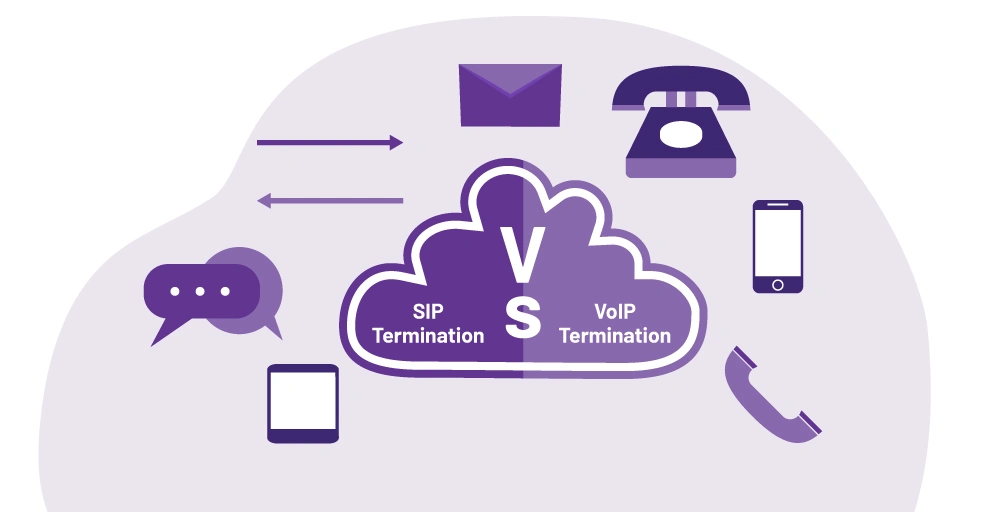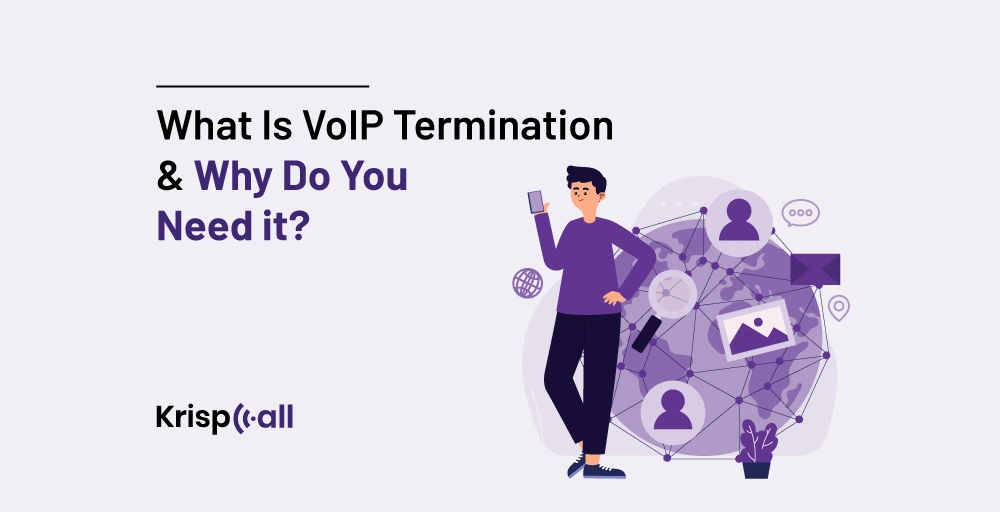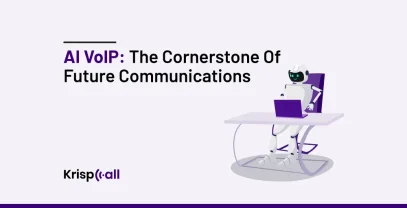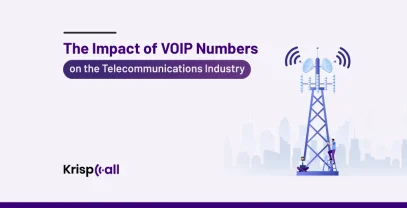Businesses use voice-over-Internet Protocol (VoIP) to manage communication infrastructure. VoIP offers affordable and flexible features for voice calls. One important component of VoIP is VoIP termination.
VoIP termination, or voice call termination, refers to making voice calls📞 from one provider to another ( including PSTN) network. VoIP termination services are important for communicating smoothly with partners, clients, and customers.
In this article, we will discuss VoIP termination and why you need it for your business.
😎KEY HIGHLIGHTS:
- VoIP termination refers to the process of making phone calls from a provider to another service provider (including PSTN) until the recipient receives them.
- VoIP termination is used in BPOs, communication companies, and collaborative companies.
- Your business needs call termination to make global calls with high quality and affordable pricing.
- Tier 1, Tier 2, and Tier 3 are three types of VoIP termination.
- When choosing a voice termination provider, look for access and controls, features, and availability with value-for-money service.
What is VoIP Termination?
VoIP termination is the completion of making phone calls from the caller until the recipient receives them. It completes calls from one provider to another (including Public Switched Telephone Network PSTN network).
Unlike traditional phone calls, Voice over Internet Protocol (VoIP) uses the Internet🌐 Protocol while making calls. Because of its flexibility, Voice termination is commonly used for telecommunication over long distances.
For example, suppose you call someone from the United States to Europe using a VoIP service. In that case, the call gets routed via the internet to the VoIP termination provider in Europe, and again, the provider routes the call to the receiver’s telephone network. This process completes the call without the need for physical phone lines.
Who Uses Voice Termination Services?
Voice termination services are used by numerous entities, especially those with a high dependency on communication, such as call centers, telecommunication carriers, and businesses of all sizes. They are used widely because of their reliable networks and smooth voice connectivity.
Some entities that use voice termination services are:
- Communication companies: Voice termination services are used by support communication companies like Skype and WhatsApp to enable calling and managing features like video calls and SMS through cloud-based data packets.
- Business process outsourcing (BPO): Businesses with an outsourcing call center model often use call termination services for smooth communication and agent training.
- Collaborative and tech companies: Collaborative companies, such as call centers, telecommunication providers, or tech companies, use voice termination to make smooth international calls. Also, with call termination, they can handle high voice traffic cost-effectively.
What is the Difference Between Call Origination and Call Termination in VoIP?
Call origination refers to handling originating calls ( incoming calls) and delivering them to your service. It mainly focuses on how the phone calls are traveled and placed to the receiver.
On the other hand, call termination refers to the completion of routing phone calls from the caller’s network to the recipient’s network until they reach their intended recipients. Once the call reaches the recipient’s device and communication is established, it is considered successfully terminated.
A simple way to differentiate call origination and termination is that call origination refers to incoming calls, whereas call termination refers to outbound calls.
In call origination, callers call the service provider or your business, and the call routes to the receiver, which is your service. But call termination is making a phone call until the receiver receives it. When the receiver finally receives it, the voice call is terminated.
VoIP Termination Vs SIP Termination
While VoIP termination and SIP termination are used interchangeably, there is a slight difference between them.
Voice Termination is the process of routing calls via the Internet using many protocols, including SIP. On the other hand, SIP termination is the call terminated using the Session Initiating Protocol ( SIP ). Understanding these differences is important when finding communication solutions for your business.

Some of the key differences between VoIP and SIP termination are listed below in the table:
| VoIP Termination | SIP Termination |
| Involves routing calls using various protocols until the recipient receives them. | Specifically utilizes the Session Initiation Protocol (SIP) for call termination. |
| Provides flexibility in choosing suitable call protocol. | Offers standardized protocols for call termination. |
| Covers a broad range of call routing services. | Solely focuses on call routing using SIP protocol. |
Why Does Your Business Need Call Termination?
Every business associated with communication requires high-quality, seamless, and reliable outbound calls from anywhere with any device. Call termination benefits businesses in numerous ways, such as making cost-effective calls and minimizing latency and jitter with crystal-clear audio.
Here are other reasons why your business needs call termination:
1. Cost-effectiveness
Call termination services allow businesses to reduce communication expenses and eliminate the cost of hardware. They use internet-based voice calls, which makes them more cost-saving compared with traditional phone systems. Also, call termination provides a high-quality voice.
Businesses can save on additional costs and use them for business growth. The cost-effectiveness of call termination makes it ideal for small and medium-sized businesses.
2. Global Access For Routing Calls
Call termination can be very useful for businesses that want a global presence. VoIP termination providers offer reliable and high-quality call termination services that help you reach different countries worldwide.
By connecting with customers, partners, and employees worldwide, businesses can expand their reach and opportunities for growth.
3. Enhanced Call quality
One of the important advantages of call termination services is that they use advanced technology to route calls through high-quality networks. This quality network provides high quality with clear voice transmission. Also, VoIP termination providers use top-tier providers to reduce the chance of call disruption.
Call termination reduces the chances of latency, eventually reducing the chances of call drops and disruption.
4. Scalability
Call termination is mainly for those who want to scale their businesses. This service helps to manage fluctuating call volumes during high peak times. Voice termination in businesses can improve handling sudden spikes without compromising quality.
Call termination allows companies to manage high call traffic and meet customer demands. Since voice termination uses the internet, it can easily change according to the global market. This leads the business to a new area by eliminating geographical barriers.
Types of VoIP Termination Providers
The types of VoIP termination providers are divided into 3 categories: Tier 1, Tier 2, and Tier 3.
Each category offers different advantages based on its capabilities. Understanding these tiers is essential for selecting the suitable provider according to the company’s communication needs.
Tier 1 Termination Providers
Tier 1 providers are the top level of VoIP termination providers. They are directly connected with major carriers, which allows them to provide the best termination routes for making reliable voice calls. Businesses that require high-quality global communications prefer Tier 1 providers. One of the top-tier VoIP termination providers is Tata Communications.
Tier 2 Termination Providers
Tier 2, on the other hand, mainly collaborates with multiple Tier 1 providers to broaden their use and offer a wide range of termination routes. Tier 2 providers can provide flexible pricing and a wide coverage range that makes them affordable and suitable for small to medium businesses. This provider is especially used by businesses that want to diversify communication options.
Tier 3 Termination Providers
Tier 3 providers specialize in specific industries and markets. They offer unique features to meet specific communication needs. Though they don’t have high global scalability like Tier 1 and Tier 2, these providers are great for providing specialized solutions for businesses with specific requirements.
How to Choose the Best VoIP Termination Provider?
A VoIP termination provider is a telecom provider that offers services like voice and call terminations. It allows outbound calls to be placed at the recipient’s phone number. Most VoIp termination providers offer features like high-quality calls, reliable security, intelligent call routing, and centralized call management.
When choosing the best VoIP termination provider, you need to keep these things in mind:
- Cost with value: When choosing a VoIP termination provider, consider the quality they provide matches the charging cost. Often, providers decide how to route your calls, so they may use least-cost routing (LCR) while charging you a high amount.
- Access & controls: Before choosing a provider, check if they provide you with full admin privileges for routing and managing calls when received. Different providers have different access control levels, so it is crucial to research whether the provider can fulfill your needs.
- Features with flexibility: Not every feature is equally important to all; it varies according to your needs. Some essential features include local, international, toll-free numbers, local caller ID, and advanced routing.
- Availability: You must also find a provider with a high redundancy and support system. This will ensure your backups in case of system failure or data outages, which is often essential when working with communications data.
Final Thoughts
VoIP termination is often used by companies with communication needs or collaboration requirements. With VoIP termination, businesses get smooth, reliable global communication with enhanced quality and cost-effectiveness.
With a wide range of options in the market, you need to be wise while deciding to set up a provider. When choosing termination providers, Tier 1 providers can be the best compared to Tier 2 and 3. Nonetheless, you must also consider features like cost with value, availability, features, and customer support provided.
It is not specifically specialized, but VoIP termination is vital for every business or company that requires quality communication with a global range.





